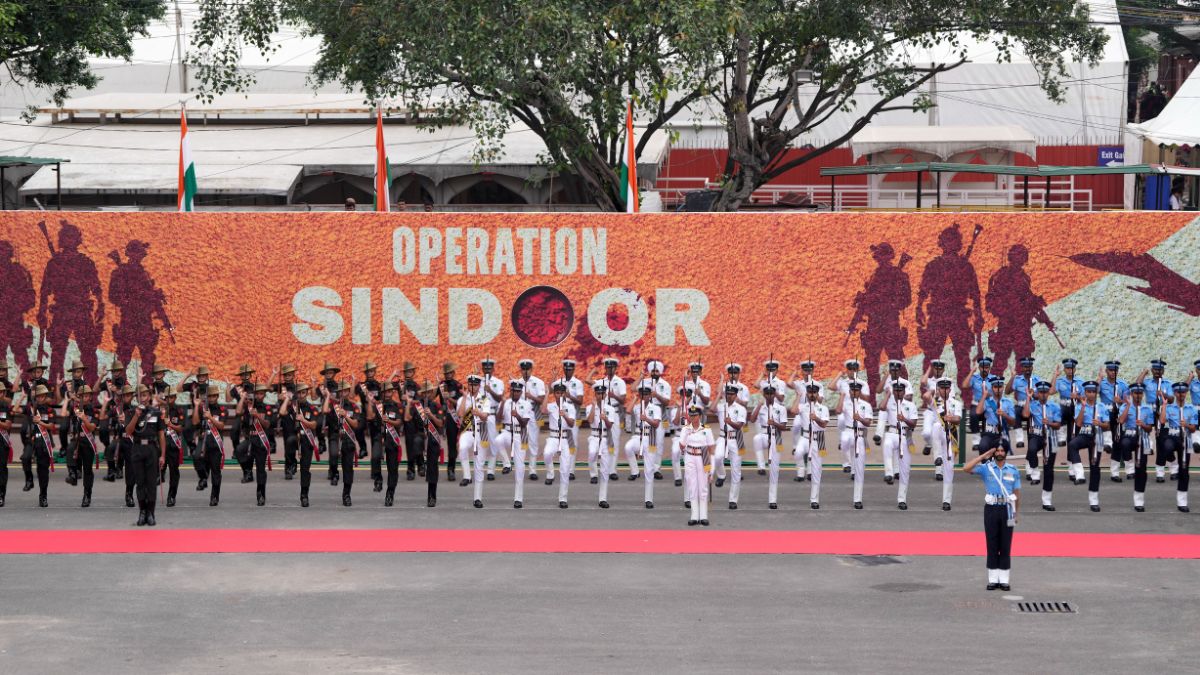Prime Minister Narendra Modi, speaking from the Red Fort on the occasion of 79th Independence Day, said that India would not accept nuclear blackmail, sending a direct message to Pakistan.
His message to the neighbouring country came after repeated warnings from Pakistani Prime Minister Shehbaz Sharif and Pakistan Army Chief Asim Munir over the Indus Waters Treaty .
Catch latest updates related to Independence Day here .
PM Modi said during his speech that the Indus Waters Treaty with Pakistan was “unjust” and “one-sided” and added that blood and water could not flow together.
We look at his warning to Pakistan regarding the treaty:
Indus Waters Treaty to Operation Sindoor: PM Modi’s warning to Pakistan
In his speech, the prime minister referred to the Indus Waters Treaty and the success of Operation Sindoor while issuing a strong warning to Pakistan.
Notably, Islamabad has been making aggressive statements against India while asking New Delhi to restore the full functioning of the Indus Waters Treaty, which has been on hold since May.
Pakistan PM Shehbaz Sharif said that if India tried to “snatch even one drop of Pakistan”, it would be “taught such a lesson that you will be left holding your ears”. Earlier, former Foreign Minister Bilawal Bhutto-Zardari and Asim Munir had also warned India over the treaty.
ALSO READ | PM’s Independence Day speech: Why the address is delivered from the Red Fort
So, how did PM Modi respond? Here’s a look:
On Indus Waters Treaty
PM Modi said the Indus Waters Treaty with Pakistan was “unjust” and “one-sided”, adding that blood and water could not flow together.
He added, “A compromise on farmers’ interests and national interests is not acceptable to us. Not anymore.”
Impact Shorts
More Shorts“What kind of agreement was this that has caused such unimaginable loss to our farmers for the past seven decades? Only India has the right to its rightful share of water,” he said.
The prime minister also said in his speech that India would not tolerate nuclear blackmail, before stating that the country no longer accepted the water treaty.
“India will no longer tolerate nuclear blackmail. If the enemy dares to commit any more misadventure, the Indian Armed Forces will give them a befitting reply,” PM Modi said.
Notably, the Indus Waters Treaty, signed between India and Pakistan in 1960, laid out a system for sharing the waters of the Indus River. It was suspended in response to the Pahalgam terror attack on April 22, which claimed 26 lives.
On Operation Sindoor
During his speech, the Prime Minister said the armed forces had been given full freedom during Operation Sindoor , with the decision on the “time, location and date” left entirely to the military leadership.
“We gave freehand to our forces, we told them forces that time, location and date you will decide,” he said.
He went on to say, “I am very proud that from the ramparts of the Red Fort, I am getting the opportunity to salute the heroes of Operation Sindoor. Our brave jawans punished the enemy beyond its imagination. On 22nd April, terrorists from across the border came to Pahalgam and killed people after asking their religion… Entire India was outraged, and the entire world was shocked by such a massacre.”
He added, “Operation Sindoor is the expression of that outrage. After the 22nd, we gave a free hand to our armed forces. They decide the strategy, target and time. Our Forces did what had never been done for several decades. We entered hundreds of kilometres into the enemy soil and razed their terrorist HQ to the ground… Destruction in Pakistan is so massive that new revelations are being made every day and new information is coming out daily…”
He credited the Atmanirbhar Bharat initiative for making such an operation possible, stating that India’s growing self-reliance in defence meant it could act quickly without having to depend on other countries.
“Had we not been self-dependent, Operation Sindoor would not have been possible. We would be worried about ‘who is going to help us’ or ‘who will not help us’… (Operation Sindoor) happened because of Make in India,” he said.
“Our enemies had no idea about the capability of ‘Make in India’, which weapons are simple and which are powerful enough to destroy them in a moment. Just think, if we were not self-reliant, would we have been able to carry out Operation Sindoor with such speed?”
Notably, after the Pahalgam terror attack, India launched Operation Sindoor, a major military strike that destroyed nine terrorist camps in Pakistan and Pakistan-occupied Kashmir and eliminated over 100 terrorists.
)